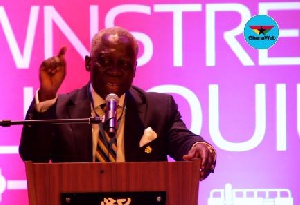Despite the advent and huge campaign of the green economy, oil remains a valuable commodity capable of changing the economic fortunes of any country.
While the future situation is sure to change as extraction technology improves and old wells quickly going dry, Senior Minister Yaw Osarfo Maafo has thrown caution to the wind, urging industry players to confront challenges affecting them and maximize profit.
According to the Minister, some countries in the advent of discovering oil field have shifted all the resources (at the expense of other sectors) to production and exploration and yet are still not reaping the full benefit – a situation he described as the bane associated with being petroleum producing.
The Senior Minister bewailed the huge fortune this mishap has cost many economies around the globe, challenging downstream players of oil and gas industry to identify bottlenecks that impede progress.
“Once you become a petroleum country, so many stories are associated with you. The curse of the industry has made many countries to suffer. Abandoning their agriculture and focusing on petroleum and creating problem for themselves.” He said.
Latest figures have shown that revenue from Ghana’s oil production increased by 67 percent for the first half of 2017 compared to the same period in 2016.
The semi-annual report on the Petroleum Holding Fund and Ghana’s Petroleum Funds shows that Ghana realized 191.32 million dollars in revenue in the first half of this year compared to the 114.4 million dollars it received in the same period last year.
Senior Minister, Yaw Osarfo Maafo who was speaking to participants of the 2018 Petroleum Downstream Colloquium organized by the National Petroleum Authority in Accra urged them to smoothen operations to maximize returns.
Mr. Osarfo Maafo further charges the industry actors to eschew legislations that create a long bureaucratic process that affects smooth operation.
“Sometimes in this country, we tie our hands with the kind of legislation we agree on, the idea is not to make legislation such that people in operation find it difficult to move because they will need 30 approvals before they take one step, that is not the type of legislation we are looking for” he cautioned.
Click to view details



Business News of Wednesday, 31 January 2018
Source: www.ghanaweb.com

















